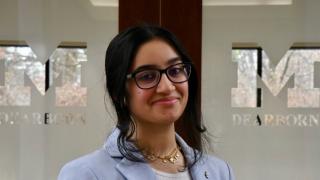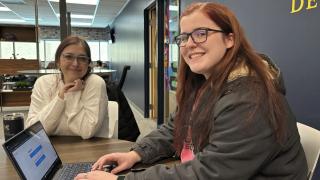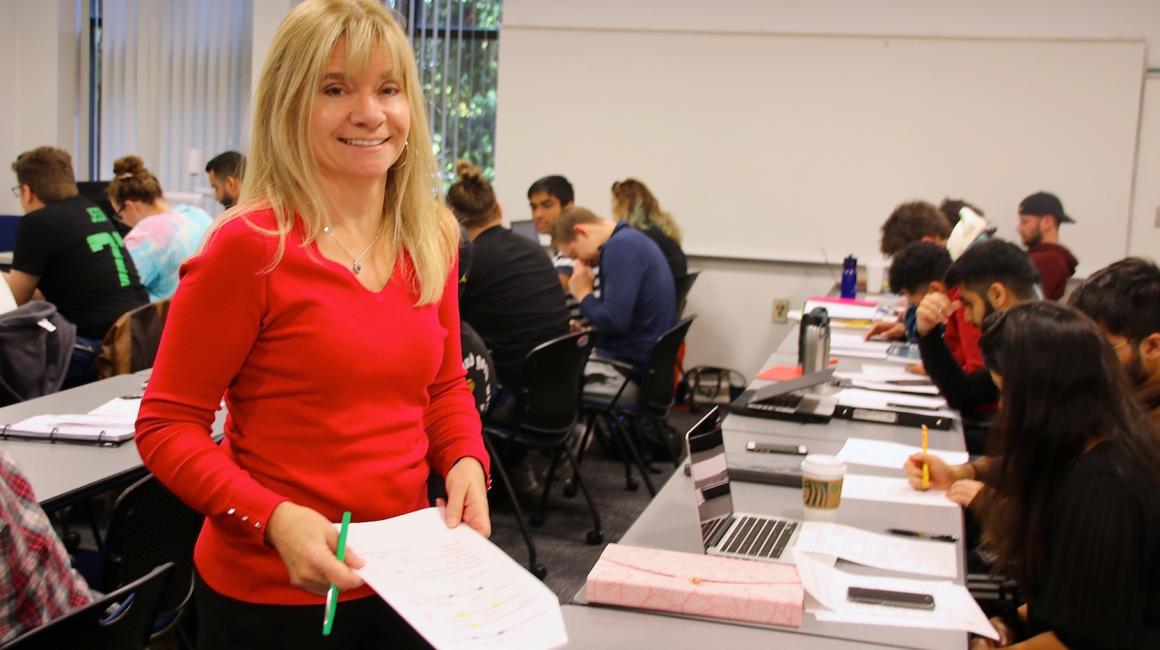
This article was originally published on October 17, 2019.
College of Business faculty member Patty Graybeal’s managerial accounting course is a large class with mostly sophomore-level students. Realizing not all of them will go on to be accountants — but knowing the lessons are useful in future business classes, their careers and everyday life — she looks for ways to reach them.
Graybeal does “Your Turn” exercises in class to show how accounting is relevant. For example, to explain the concept of managing costs, Graybeal compares business costs to a student’s cost of attending college — emphasizing controllable versus non-controllable costs.
She encourages students to try applying the concepts and using equations without the help of their phone’s or calculators and walks around the room giving one-on-one assistance. She even color codes the equations and concepts on the board to make it easier to follow along.
This semester Graybeal did something else in an effort to help her students: She chose a textbook that 's completely free and saved each student in her class up to $200.
The textbook is on OpenStax, an Open Educational Resources (OER) that provides freely accessible and openly licensed textbooks or other digital assets for teaching and learning. The students have access to the materials online or they can download a pdf.
And Graybeal is very familiar with the OpenStax accounting textbook she chose — she wrote it.
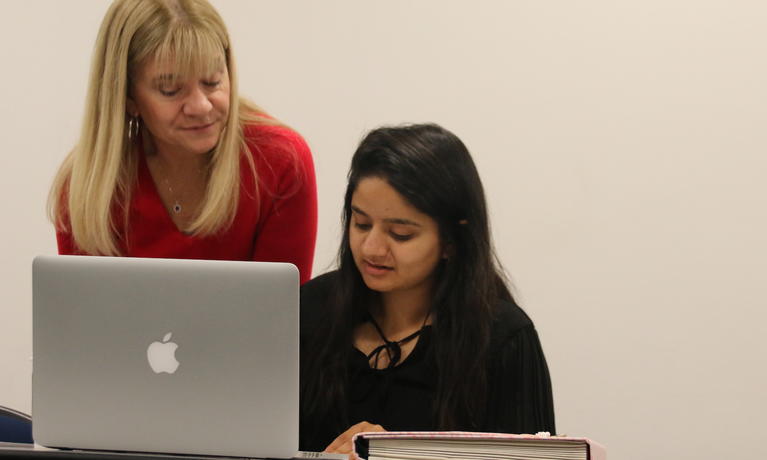
Principles of Accounting Vol. 2 Managerial Accounting, which was published in July, was created with student and faculty educational needs in mind; she thought about how to keep students engaged and how to help faculty teach. For example, each chapter starts with “Why It Matters,” a scenario that relates the chapter material to a student-related situation, such as managing a student organization.
What started as a cold call out from OpenStax — a Rice University-based publisher with funding from the various foundations such as the Bill & Melinda Gates Foundation and the Koch Foundation — looking for business faculty to write textbooks turned into Graybeal’s nearly three-year 739-page project.
“I know some of our students are struggling financially; it was very motivating for me. I wanted to write a textbook that they could read because it was free. And that they would read because they found it interesting. I wanted to create useful supplements,” says Graybeal, who also contributed to Principles of Accounting Vol 1 and crafted over 1,400 PowerPoint slides for both texts. “I simply want students to learn and hopefully appreciate what they have learned. Removing any barriers, such as cost of materials, is a first step.”
Sophomore Chris Kachigian says it is the first time he didn’t need to worry about buying an expensive textbook for a class. “I can use that money for gas to get here,” says Kachigian, noting that he doesn’t discard print as a medium, but many of his required textbooks — each costing hundreds of dollars— won’t be used beyond the class. “I’m not an accounting major, but this book is actually interesting as far as textbooks go. And it doesn’t take up space like the one I have just sitting in my closet because I couldn’t sell it. It’s pretty cool that Professor Graybeal did this.”
OERs in higher education have been on the upswing during the past few years and with the high quality of today’s publications, more and more institutions are looking into ways to incorporate OERs into classrooms. And UM-Dearborn is among them.
Professor and Interim Library Director Maureen Linker, who leads campus’ OER Task Force, says courseuse of OERs has the potential to increase teaching efficiency and reduce economic barriers to education through these shared resources.
Linker says college students are struggling to get ahead, so reducing the cost of course materials — in this instance, textbooks — is a good thing. Linker says a 2017 OER campus student survey reported some students had to choose between buying groceries or textbooks; that finding was motivation for the task force.
And not making people choose between needs and textbooks leads to students having the materials they need to be successful: A 2018 publication in International Journal of Teaching and Learning in Higher Education found that DFW rates — rates where students have grades of D, F or Withdrawal — decreased by one-third among minority and Pell-eligible students in classes that switched from commercial textbooks to OER.
On the teaching side, there’s a benefit through the resource sharing — which includes prompt questions, class activities, study guides, talking points and more — that faculty can find on OER websites along with the textbooks.
Linker knows that OERs may not always provide a perfect solution — for example, e-text may be an unfamiliar territory for some — but free quality resources are a move toward equity in educational access. For any issues that arise, Linker says the task force will research solutions. To address the above example, they are looking into low-cost publication services for campus use and providing how-to-use OER educational workshops.
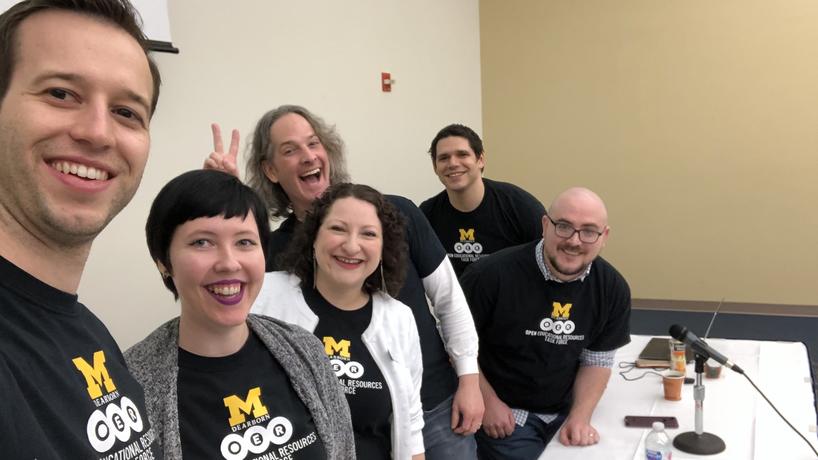
As an incentive to try it out in the classroom, the OER Task Force offered grants to College of Arts, Sciences, and Letters faculty — CASL was chosen because it had the largest amount of OER resources available in appropriate subject matter — who were interested in remixing and adapting OER texts for use in Fall 2019 courses. Linker says Graybeal was ahead of the trend and acted independently in her OER work, but they’ll work together in examining campus outcomes.
Now implemented in four classes that have a combined 26 sections, OERs have saved students $263,000 in this Task Force initiative. Linker says the faculty are happy with the results too. The UM-Dearborn OER Task Force is presenting at a statewide conference Friday about the success of the program. And there will be a campus panel discussion and lunch at 12:15 p.m. Oct. 25 in Library Room 1216 to hear from faculty about their OER experiences.
With the success of their first major OER campus push, the grant program will expand to all colleges in 2020. The application process and additional information will be announced in January. The task force will also run OER trainings on how to find and tailor materials to a professor’s class needs.
Because of educational efforts and positive experiences, there’s been an increase in OER awareness. According to a 2017-2018 survey about teaching materials in U.S. higher education, responses from more than 4,000 faculty and department chairpersons report that nearly 50 percent of faculty have OER awareness, up from 34 percent in 2014-2015. And with this increased awareness, it’s believed the OER adaptation will continue to steadily grow.
“OpenStax has saved students over $600 million in textbook costs since 2012. For my text alone, there have been nearly 20,000 downloads and it’s only been available for a couple of months. It’s rewarding to see so many classrooms incorporating it in their lessons and to realize the impact of free textbooks,” Graybeal says. “This is not a fly by night thing. The more people understand about OER — that these are well-written, well-cited learning and teaching resources that are free, accessible and customizable — the more we all benefit.”
The members of UM-Dearborn's OER Task Force are: HUB for Teaching and Learning Instructional Designer Autumm Caines, Library User Services Supervisor Anna Granch, Library Interim Director Maureen Linker, CEHHS Librarian Raya Samet, HUB for Teaching and Learning Instructional Designer Alfonso Sintjago, Library Electronic Resources Specialist Tim Streasick, and Mathematics Associate Professor Alan Wiggins.

